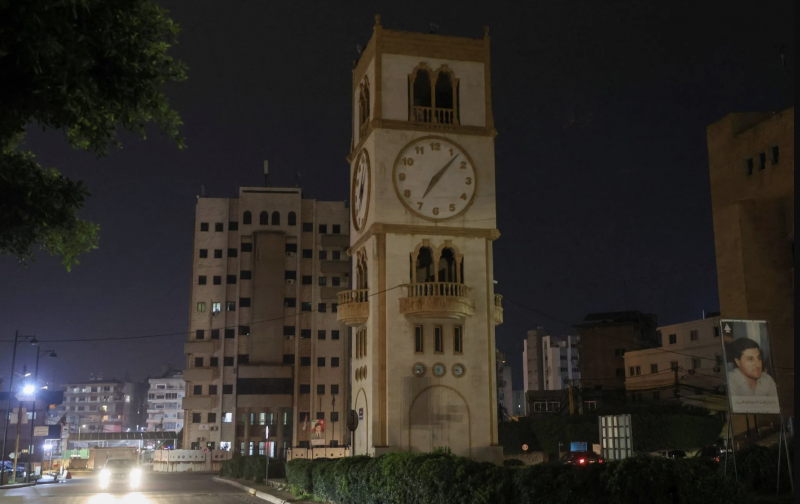
The clock in the central square of Jdeideh, in the suburbs of Beirut, on March 25, 2023. (Credit: Mohamed Azakir/Reuters)
“So we’re going to live an hour off from the rest of the world?”
This sentence, overheard in a café, illustrates the confusion among Lebanese who, over the weekend, found themselves at the mercy of a government decision to delay daylight savings time by one month.
Faced with backlash, the government backtracked on its decision Monday and announced that Lebanon would, after all, switch to summer time Wednesday night.
But in the meantime, the delayed transition has complicated daily lives already burdened by an unprecedented economic crisis.
It also risked plunging the country into a new climate of sectarian tensions, as it was presented as a unilateral decision following a discussion between caretaker Prime Minister Najib Mikati and Parliament Speaker Nabih Berri in consideration of the sunrise-to-sunset fast many Muslims observe during Ramadan, which began last week.
A video of the exchange between Mikati and Berri, which shows how (and with apparent carelessness) the measure was decided late last week, provoked the anger of some majority-Christian schools, businesses and political parties. At their helm is the Maronite Patriarchate, who chose not to follow the delayed time shift.
However, this rebellion is not only confessional and political; many private businesses and media companies have decided to disobey in light of the complicated consequences of a last-minute decision to postpone daylight savings in an ultra-connected world.
Among those organizations was L’Orient Today.
Ahmad*, a 23-year-old student from the southern suburbs of Beirut, said that, for observers of the Ramadan fast the time change only has “psychological” impacts.
"This whole issue is very psychological. Since the breaking of the fast is always done at the same time, the sky is the same; it's the time on the phone that is different.”
“I do not understand those who see in [the decision] a desire for supremacy of Muslims over other communities. On the other hand, those who protest against its consequences on daily life are right. Such a decision cannot be made in an improvised way, there are technical problems that arise from it,” Ahmad continued.
One teacher in Geitawi, a majority-Christian neighborhood, who requested anonymity said he believes Lebanon should not follow the decision to delay daylight savings.
But his defiance is not based on confessional grounds, he maintained.
"This measure harms our connection to the world. The behavior of those in charge is a shame! It is not logical," the teacher said. Lebanon’s school system, meanwhile, has shifted to daylight savings time, caretaker Education Minister Abbas Halabi said in a statement Sunday.
Why the confessional slant?
For Lebanon’s Christian-majority parties, which are already in a political spat with Mikati over the various powers he can wield during the country’s presidential vacancy, this was the last straw, said Sami Nader, director of the Institute of Political Science at the University of Saint Joseph (USJ).
Mikati sparked controversy in recent weeks when he mentioned that Christians formed less than 20 percent of Lebanon’s population.
To Nader, the decision to postpone summer time was "irresponsible.” He noted that this new controversy broke out during last week’s visit by an International Monetary Fund (IMF) delegation, which criticized political leaders for stalling on reforms required for a bailout deal.
"It was Nabih Berri who pushed for this measure, and the Christian parties jumped into the breach by reacting in this way," posited Makram Rabah, a political commentator and history professor at AUB, referencing a recent video showing a meeting between the Parliament speaker and Mikati.
For him, this is a maneuver with "predictable" consequences for an old hand in Lebanese politics like the leader of the Amal Movement, aimed at diverting attention from the failure to elect a president and all the other failures of the political class.
"What matters to Nabih Berri is to buy time to try to protect this now moribund system, playing on the good old confessional string. This explains his role in this affair, while the question of time is a prerogative of the cabinet, not the head of the legislature.”
An ‘illogical’ decision
"Don't talk to me about coexistence anymore," Ibtissam, a Sunni resident of Beirut’s Mar Elias neighborhood told L’Orient-Le Jour.
Some Lebanese people were suspicious that the move may have been political and resisted the temptation to give into the wave of ambient communitarianism.
"I think they just wanted to curry favor with the population and divert attention from their systematic looting of the state," said Mirvat, a Sunni resident in Beirut.
Delaying daylight savings had no impact on the time at which the Ramadan fast is broken. In any case, “those who decide to fast do not fear an hour more or less, so we are not told that [the delay] is a favor for Ramadan,” said Mirvat.
Then there are those who decided not to comply with the decision out of fatigue.
"I haven't heard about the confessional quarrel but, in my company, we find this measure detrimental to us because we often organize conferences with foreigners," said Jamil, a 26-year-old who spoke to L’Orient-Le Jour in Beirut.
He initially didn’t specify his religious identity because he finds the question "not relevant," but ultimately shared that he is Shia. Still, he finds the decision "illogical."
According to Nader, Lebanese people are wary and tired of blunders made by the government. As these blunders multiply, they may be less likely to follow state directives.
"All this decision has done is further discredit a stumbling state,” said Nader. “[This] further delegitimization of the ruling class explains the beginning of this civil rebellion."
*Names have been changed.
This article was originally published in French in L'Orient-Le Jour.